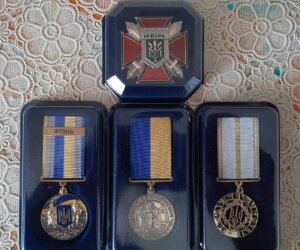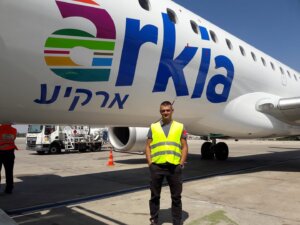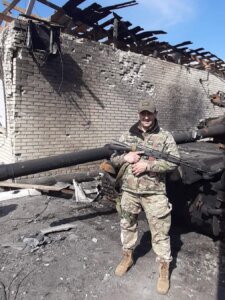A Ukrainian Jew made aliyah. Now he’s back in his homeland fighting Russia
Know as ‘Yevrey’ — Ukrainian for ‘Jew’ — he’s helped defend Kyiv and care for his hometown’s elderly

Graphic by Angelie Zaslavsky
KYIV, Ukraine — Growing up in Irpin, a small Ukrainian city not far from Kyiv, Serhii Pruzhanskyi had no idea he was Jewish. His first hint was at age 7 or 8, when a classmate taunted him with an antisemitic slur. When he ran home to tell his parents, his father changed the subject.

Fast forward a few decades, and Pruzhanskyi, now a decorated soldier fighting to defend Ukraine, goes by the call sign Yevrey (pronounced yee-vray) – Ukrainian for Jew. And he has drawn on what he learned serving in the Israel Defense Forces to help resist the Russian attack on Kyiv and, more recently, liberate the occupied city of Kherson.
Unearthing the Jewish past
A hundred years ago, Jews made up 20% of Kyiv’s population, and more than half in some of its neighborhoods. Today, they are all but invisible. Pruzhanskyi, 43, is the exception that proves the rule. But his story is an intriguing window on some of what’s at stake in the war.
Religion was all but forbidden in the Soviet-controlled Ukraine of Pruzhanskyi’s childhood. Antisemitism kept what Jewish life there was hidden behind closed doors. By the time he came of age in a newly independent Ukraine, there was a fledgling Jewish community in Irpin. A family friend helped lead it, and a niece attended prayer services.
Then, Pruzhanskyi’s sister traveled to Israel on a 10-day Birthright tour. Pruzhanskyi himself had no interest in religion, but he was struggling to find himself, and when a relative suggested making aliyah, it appealed to his sense of adventure. “Why not try it?” he recalls thinking.
The first step was proving he had the Jewish roots required to qualify for Israeli citizenship. This was no easy task in a part of the world where two world wars had killed millions and scrambled borders, driving mass migrations of Jews, Poles and Ukrainians. Pruzhanskyi knew his mother wasn’t Jewish, but when he finally persuaded his father to talk, the older man opened up about his parents.
Serhii’s paternal grandmother, Klara, had been born in Odesa to a family of Sephardic textile merchants. His grandfather, Leib, was from Poland. During World War II, Leib fought in the Red Army, while Klara and her 9-year-old daughter, Ida, were among hundreds of thousands of Jews evacuated to the Soviet interior.
“They spent the war in Uzbekistan,” Pruzhanskyi explained in a recent interview in a cafe in downtown Kyiv. “That’s probably how they survived” — while more than a million Jews were murdered in Ukraine.
Making aliyah
It was Pruzhanskyi and his sister, searching online, who found the manifest documenting Klara and Ida’s evacuation. It was the proof he needed to make aliyah, and in 2007, he arrived in Israel.
There, as in Ukraine, he struggled a bit at first. He attended ulpan — school to learn Hebrew — but still had trouble communicating in the language. He worked taking inventory in a warehouse, then in a bus factory and as a janitor. Already in his late 20s, he was too old to be drafted. His luck seemed to change when he served for a year in the reserves.

He finally landed a good job in security at Ben-Gurion International Airport. As he moved from thing to thing, he said, he was struck by the kindness and warmth of the Israelis he met.
“There’s a kind of trust I’d never seen before,” he explained. “Of course, people squabble there like anywhere else, but they’re united by something bigger than themselves, and when something happens — a missile attack, a storm, a war — they help each other.”
In 2019, Pruzhanskyi learned that his mother was ill, and he returned to Irpin for what he thought would be a few weeks to care for her. He buried her in 2021 and stayed on to deal with probate issues. In early 2022, he was preparing to return to Israel when Russia invaded Ukraine.
Enlisting to defend Ukraine

Irpin came under attack in the first days of the war, and Pruzhanskyi was one of the first men in line at the recruiting office. “I didn’t have to think twice,” he said. “I knew I had to enlist and stand with my friends to defend Irpin.”
Like many Ukrainians, when asked about his experience in the war, Pruzhanskyi reached for his cellphone. He showed me a photo taken a few days after the invasion of him in a bulletproof vest with a Kalashnikov rifle. In the next image, he’s helping evacuees at the railroad station. “Things were completely chaotic,” he recalled. “But what I’d learned in the Israeli army kicked in. I knew how to turn off my panic and do what I had to do, how to keep my mind clear and make decisions.”
Over the next month, he saw active duty all around Irpin. Some 90% of the city’s 100,000 residents evacuated in the first days, many of them under a destroyed bridge widely featured in the media when a Russian missile killed four civilians trying to escape to Kyiv. Then the two armies fought at close range in the empty streets for more than four weeks.
By the time the fighting stopped, 70% of Irpin’s buildings had been damaged or destroyed and local estimates suggested that as many as 1,500 civilians were dead.
Pruzhanskyi fought at the bridge. He helped evacuate 500 civilians from Irpin and nearby Bucha, driving into the shelling in his own car, a battered sedan with the license plate “YEVREY,” to pick up people hiding in basements and bring them to the bridge.
After a chance encounter with an elite reconnaissance unit, he said, he began supplying intelligence on the movements of Russian troops — activity for which he could be tortured and shot if captured.
By the time we met, nine months after the battle of Kyiv, Pruzhanskyi was splitting his time: half in Irpin, supervising a shelter for elderly people whose homes had been destroyed, and half on the front lines, now in southern and eastern Ukraine, serving with the reconnaissance squad.
‘Things will only get worse’
Pruzhanskyi declined to say much about what he had done with that unit to help liberate the city of Kherson, which was occupied by the Russians from early March until mid-November. But he didn’t mince words about conditions in the shelter.
“The fighting is over,” he said, “but things will only get worse for these old people. Their homes are gone. They have nothing to return to. And they’ve been left here with almost no help to survive the best they can.”
He showed me a video of a sunlit day on the main square of Irpin where he received a medal from the mayor. He beamed with pride as he described the ceremony but then turned somber.
“What you don’t see,” he explained, “is what came next. The widow of my best friend and comrade in arms also got a medal from the mayor that day.”
The echo of history
If Pruzhanskyi sees the eerie echo of history that connects his grandmother Klara and the evacuees he rescued from Bucha and Irpin, he did not mention it. But he is eager for the world to know about the horrors he has witnessed. “You need to tell Americans about that sorrow and suffering,” he said. “You need to shout it to the world.”
Pruzhanskyi has noticed changes in Ukraine since he returned from Israel. He said he had experienced no antisemitism. “On the contrary,” he explained, “when I tell people I’m Jewish, they often respect me more, especially in the military.” And he feels the war has brought people together.
“It’s a little more like Israel,” he said. “People trusting and helping each other.”
As for the future — what he, like many Ukrainians, refers to as “after the victory” — Pruzhanskyi has no doubt he will return to Israel. “I was born and raised in Irpin,” he explained. “Now I’ve fought for it and for Ukraine. But I feel most at home in Israel. That’s where I belong.”















